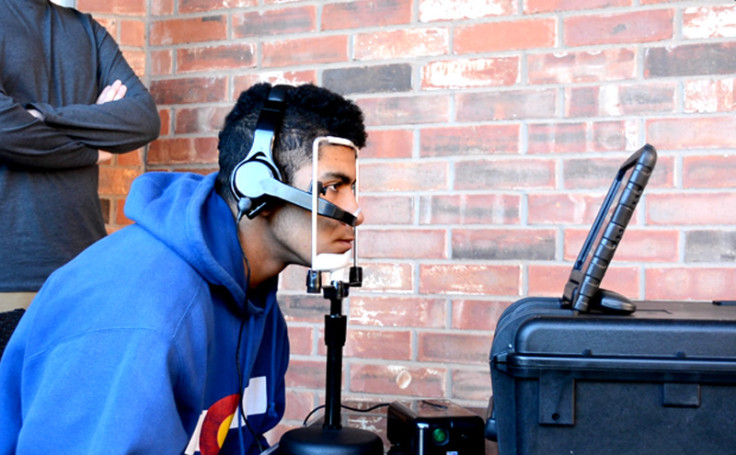EyeGuide Focus: This eye-tracking headset can diagnose concussions in just 10 seconds

A Texas-based startup has developed a headset that tracks eye movement in order to detect concussions in just 10 seconds. It could transform concussion detection and prevent serious head injuries in athletes from going undetected.
The EyeGuide Focus system features an eye-tracking headset and a portable chin mount. Its software runs on an iPad facing the patient and the user has to follow a small white circle moving across the screen with their eyes in order to set the baseline of how their eyes normally function.
Sports team coaches will be able to have the normal baselines of all their athletes on record. If an accident occurs and concussion is suspected, the athlete takes the test again; if their eye movements are not as sharp as the baseline, this highlights there might be a problem.
The EyeGuide system also becomes more intelligent the more athletes it tests, so every time a test is taken, the system compares eye movements with a database of records from other athletes. This makes it very difficult for athletes to cheat the system.
Players don't want to report potential head injuries
In the US, there are between 1.6 to 3.8 million sports-related concussions every year, according to the Centers for Disease Control and Prevention (CDC), and over 500,000 of these are in youth sports.
The US Soccer Federation introduced regulations in November forbidding young players from below the age of 11 from heading balls, and those aged between 11 and 13 are only allowed to have limited heading practice during training sessions.
One of the key problems is that young players fear they will be prevented from playing if they report any symptoms, while older players fear their team will be penalised if they have to be checked for a concussion, which places the athletes at risk of severe head injuries if they are only detected 48 to 72 hours later.
"We did a study of 800 athletes and found that 12% of them had been diagnosed with concussions before the age of 13. They have essentially broken their brains, that's the way we need to think about it," said Dr Brian Still, EyeGuide's chairman and an associate professor at Texas Tech University.
"I've [tested] children who have had to stop playing sports because they had too many concussions. This is a major issue and there are a lot of smart people – athletic trainers, medical professionals – trying to fix it. We don't want kids to stop playing sports, but we recognise that something has to be done so parents feel better about their kids playing sports."
EyeGuide, which was spun off Texas Tech University in 2010, says its system is the result of four years of development, and thousands of athletes from Texas high schools and universities have helped to test the solution.
EyeGuide makes use of neuroscience protocols
Now, the startup wants to bring its solution to more high schools in the US and to become the first company in the world to use eye-tracking technology to detect brain injuries, so it is seeking $50,000 (£33,110) in crowdfunding from Indiegogo, with 59 days left to go on the campaign. However, unlike many companies on crowdfunding websites, EyeGuide says its solution is commercially ready to go.
"The eyes don't lie. Measuring how well an athlete can follow a target on a designated pathway is a far faster and more reliable way to detect concussion than present methods. EyeGuide Focus measures neurological impairment quickly, following protocols established in neuroscience research to return quantifiable results to aid trainers and other healthcare providers in making informed decisions on concussions," EyeGuide wrote on its campaign page.
"In addition to the results in the scientific literature, the test makes sense intuitively. It is much like a quantitative version of the eye test a police officer gives a suspected drunk driver – or the 'follow my finger' test some athletic trainers give athletes to see whether they have sustained a concussion."
© Copyright IBTimes 2025. All rights reserved.






















